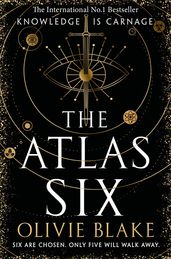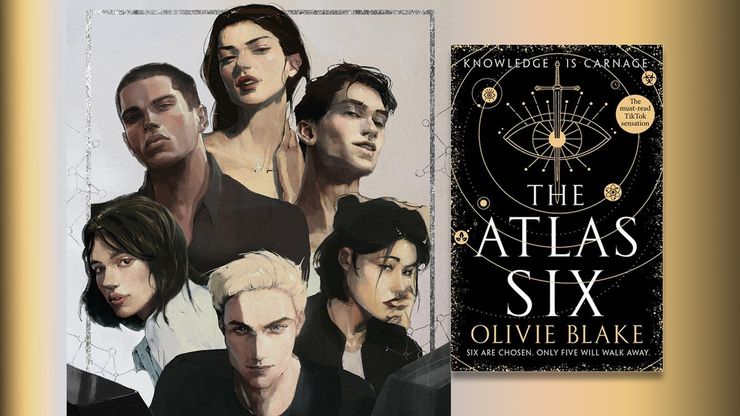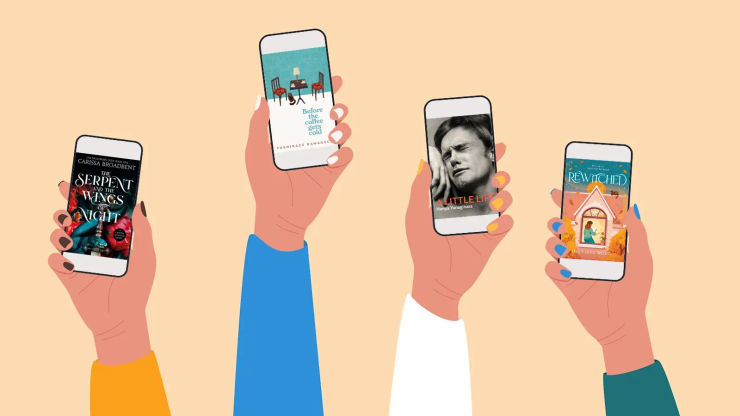Olivie Blake: how fantasy has become a home for LGBTQIA+ voices
Olivie Blake is the bestselling author of The Atlas Six – a runaway fantasy hit with a much-loved cast of LGBTQIA+ characters. Here, she shares the joy of exploring her character's sexualities in her writing, and why fantasy fiction has become such a perfect home for LGBTQIA+ characters.

When it comes to fantasy novels and LGBTQIA+ stories, something big is definitely happening.
The rich and limitless realms of fantasy fiction allow us to imagine new worlds and the people that walk within them. They allow authors to construct societies, to re-write the laws of physics, and to ask what if over and over again.
And if the magic, mystery and heart-pounding risk-it-all adventures weren’t enough to keep us turning the pages of our favourite fantasy novels, perhaps it’s also the fact that these worlds often resonate with us, as readers, more than the realities of our surroundings do.
Olivie Blake, is the author of the viral fantasy hit, The Atlas Six, which follows an enthralling cast of characters that exist freely across the sexual spectrum along a ‘sliding scale’ of desire, free from labels. Here, Olivie shares how the best speculative fiction holds a mirror to our own reality and her thoughts on why fantasy as a genre is seeing a new wave of LGBTQIA+ characters and storylines.
Want to know more? Take a look at our guide to Olivie Blake and The Atlas Six books in order.
Illustrations by @LittleChmura.
I like to think of the fantasy genre as a sort of enchanted mirror. At its core, fantasy creates a new world by reimagining the world as it is – by taking one potentially small detail of our reality and changing it, and extrapolating from there to create something extraordinary and intricate and new. But as magical as fantasy can be, it is still authored by human beings who exist in society (I know, truly disappointing). Therefore, what is produced in speculative work is still a reflection. Often, that reflection is a truer portrayal of the world as it is than fiction that proposes to be ‘realistic’, even when the setting has been fantastically transformed.
Or, as Ursula K. Le Guin once put it:
‘I talk about the gods, I am an atheist. But I am an artist too, and therefore a liar. Distrust everything I say. I am telling the truth.’
My version of telling the truth puts character before genre. What some call queer representation, I call 'a book' – in this case, a book that looks past social conventions of sexuality and identity and towards a more inclusive version of the world that I exist in. For what it’s worth, I do not consider the most interesting thing about me to be my sexuality. Far more engrossing than who I choose to sleep with are those who hold my ire. (It’s like my petty grievances are charms on a bracelet – I can hear them jingling several times a day.) Also more interesting than the biological markers of my fragile mortal cage is how I choose to love or how I value my ambition. I am large, as is anyone, and my form of speculation means crafting a world where I do not have to decide which of my many multitudes defines my life.
In crafting the characters of The Atlas Six, rather than using the typical labels for sexuality, I allowed them to exist on a sliding scale – more of a matrix, if you will. On the X-axis is essentially volume. Who the character would consider sleeping with on a scale of 'literally nobody in the entire world, irrespective of gender' to 'literally every person in the entire world, irrespective of gender.' (For those of you in the audience who do have a gender preference, you would fall somewhere in the middle, e.g. 'some people but not all.') On the Y-axis is whether feelings are intrinsically bound to the character’s attitude toward sex, which ranges from 'I only like one person on this entire earth and so help me if a hair on their head gets harmed there’ll be hell to pay,' which is always an interesting sexuality to me, to 'if you ask me to undress emotionally instead of physically I cannot fathom how I would enjoy it,' which is also very interesting.
‘In crafting the characters of The Atlas Six, rather than using the typical labels for sexuality, I allowed them to exist on a sliding scale.’
Now, obviously this would be complicated to list on a form, and sociologically speaking, this is not a helpful matrix for purposes of, say, municipal services or taxes. But to that I say, my world has magic, what does yours have to offer me? And it appears that many agree.
My book, which is a contemporary fantasy, has the unique position of being functionally crowd-sourced. A year after it was published, an unprecedented amount of readers took to their various corners of the interwebs over my self-published, unconventional story about a 100% sexually fluid cast and said 'those are my hot nerds' (lightly paraphrased). This, in a time of increasingly diverse fantasy, cannot be a coincidence.
In an age where representation matters, I think the enchanted mirror of fantasy is suggesting that new stories can now safely – and even virally – be told.
I’m not the first to imagine that a universe with powers beyond comprehension does not waste time on bigotry. And while I’m not exactly a scholar of queer literature, I think it’s fair to say that something’s in the air. How else to explain Tasha Suri, Nghi Vo, Shelley Parker-Chan, Emily Tesh, Freya Marske, TJ Klune, Everina Maxwell, and Tamsyn Muir?
‘I’m not the first to imagine that a universe with powers beyond comprehension does not waste time on bigotry. ’
Fantasy is an enchanted mirror because it can reveal what’s lurking in the shadows, and in the same moment show us in our best light. When we reimagine the rules of our reality, we get to determine which ones can stay and which can go. Why shouldn’t we love who we love, or want what we want, and what truer truths can we reveal about our natures when we transcend the mundanities that tell us no? Literature is gothic, haunted by the voiceless. But in fantasy, this is not a problem. Here, all the ghosts can speak.
I am an artist, and I am a liar. I write about libraries that don’t exist and magic that has never existed. Distrust everything I say, but know I am telling the truth – the truth as I see it, as I live it, with fiction as the mouthpiece for my own desires and convictions and faults. The world where I make the rules is indivisible from my reality, but also, my reality is more than my rules. It is the contents of my mind, the ills of my society, the characteristics of my age, the cravings of my heart. My mirror contains my story.
And tbh, it’s queer as hell.
Ready to dive in? Discover Olivie's chart-topping fantasy success The Atlas Six:
The Atlas Six
by Olivie Blake
Dark-academia fantasy novel The Atlas Six was originally self-published by Olivie Blake, and was then snapped up for re-publication after it shot to fame on TikTok. The story follows six young magical practitioners as they compete to join the secretive Alexandrian Society, whose custodians guard lost knowledge from ancient civilizations. Yet each decade, only six practitioners are invited – to fill five places. Following recruitment by the mysterious Atlas Blakely, they travel to the Society’s London headquarters. Here, each must study and innovate within esoteric subject areas. And if they can prove themselves, over the course of a year, they’ll survive. Most of them.



